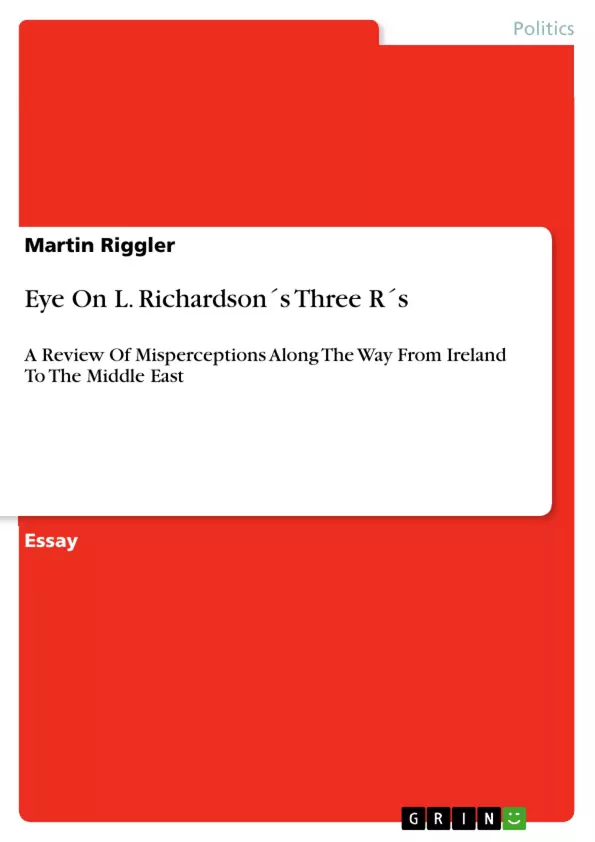One of the major changes regarding post 9/11 terrorist-studies is rarely taken notice of: The sudden and more urgent than ever before manifested strive to understand terrorism in its roots and methods by both political decision makers and society. Seemingly almost in
accordance to the political behavior of the former S-administration, promptly demanded answers for questions of a kind not being posed before by the public, led to quite a variety of outcomes that can be subsumed the same way the socio-critical American journalist Henry
Louise Mencken noted as early as 1920: “There is always a well-known solution to every human problem – neat, plausible, and wrong.”.
This paper takes a close look at the three R´s of revenge, renown and reaction that the wellknown political scientist Louise Richardson identified as the immediate motives of terrorists and hence sine qua non for the phenomenon.
Inhaltsverzeichnis (Table of Contents)
- I. Introduction
- II. Definitions & Basics
- III. Richardson's Three R's
- A. Northern Ireland
- B. Islamist Terrorism
- IV. Misperception: Examining the Three R's
- A. The IRA: Revenge, Renown and Reaction
- B. Islamist Terrorism: Revenge, Renown and Reaction
- V. The "Three R's" in the Context of Terrorist Movements
Zielsetzung und Themenschwerpunkte (Objectives and Key Themes)
This paper critically analyzes Louise Richardson's "three R's" framework for understanding terrorist motivation, specifically focusing on the applicability of her theory to both Northern Ireland and Islamist terrorist movements. The paper aims to determine whether her attempt to unify the motivations of diverse terrorist groups under this framework holds up to scrutiny in direct comparison between these two contexts. Furthermore, the paper seeks to address the problematic nature of broad observations in terrorism research, highlighting the complex compositional background that contributes to terrorist motivations.
- The applicability of Louise Richardson's "three R's" framework to different forms of terrorism.
- The complexities and limitations of generalizing terrorist motivation across diverse contexts.
- The role of misperception and media influence in shaping our understanding of terrorism.
- The importance of critical analysis in terrorism research and the need to move beyond traditional state-centric perspectives.
- The potential for misconstrued connections between terrorist movements and the impact of such misperceptions on counterterrorism efforts.
Zusammenfassung der Kapitel (Chapter Summaries)
- I. Introduction: This chapter introduces the paper's focus on analyzing Louise Richardson's "three R's" framework and its applicability to diverse terrorist movements. It highlights the importance of a critical approach to terrorism research and the need to move beyond simplistic explanations.
- II. Definitions & Basics: This chapter establishes a working definition of terrorism based on Richardson's work and explores the characteristics of terrorist organizations, drawing comparisons to the approaches of other prominent authors in the field. It addresses the complexities of understanding terrorism and emphasizes the importance of moving beyond simplistic definitions.
- III. Richardson's Three R's: This chapter provides an overview of Richardson's "three R's" framework and its application to Northern Ireland and Islamist terrorism. It discusses the significance of these two contexts for analyzing the framework and highlights the potential for misperception regarding the motivations of terrorist groups.
- IV. Misperception: Examining the Three R's: This chapter delves deeper into the "three R's" framework and its application to the IRA and Islamist terrorism. It examines the motivations and complexities of these movements and critiques the potential for misinterpretations arising from the framework.
Schlüsselwörter (Keywords)
This paper examines the "three R's" framework, terrorism, terrorist motivations, misperception, media influence, Northern Ireland, IRA, Islamist terrorism, critical terrorism studies, counterterrorism efforts. It explores the complexities of understanding terrorist motivations in diverse contexts and the impact of misperceptions on research and policy.
Frequently Asked Questions
What are Louise Richardson's "Three R's" of terrorism?
The "Three R's" stand for Revenge, Renown, and Reaction, which Richardson identifies as the primary motives for terrorist groups.
How does "Revenge" manifest in terrorist motivation?
Terrorists often see themselves as avenging perceived injustices or humiliations suffered by their community or religious group.
What is meant by "Renown" in Richardson's framework?
It refers to the desire for publicity and recognition for their cause, ensuring that their message is heard globally through media attention.
How do terrorists use "Reaction" to their advantage?
Terrorists aim to provoke an overreaction from the state, which they hope will radicalize the population and gain them further support.
Does the framework apply to both the IRA and Islamist terrorism?
While Richardson attempts to unify these motivations, critics argue that the specific contexts of the IRA and Islamist groups show significant differences in how these R's are weighted.
- Quote paper
- Martin Riggler (Author), 2010, Eye On L. Richardson´s Three R´s, Munich, GRIN Verlag, https://www.grin.com/document/158901



